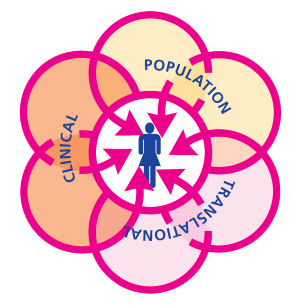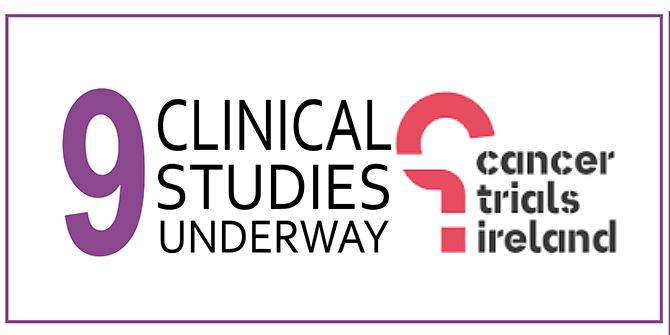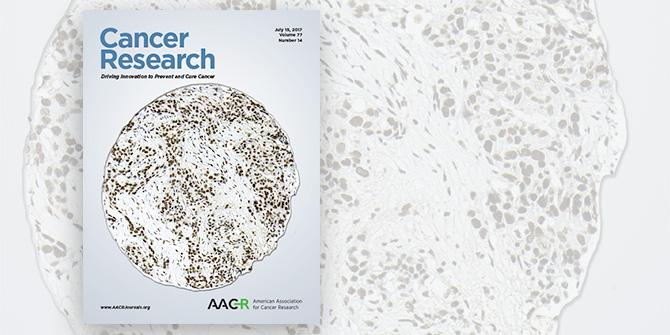An international research collaboration led by University College Dublin (UCD), involving the UCD spin-out company OncoMark and Bellvitge Biomedical Research Institute in Barcelona, has identified a set of biomarkers strongly linked with survival in patients with melanoma that may help clinicians with treatment decisions. The study has also identified several biomarkers of tumour development and progression that have never been linked to cutaneous melanoma until now.
Cutaneous melanoma is the most life-threatening form of skin cancer with rising incidence and mortality rates particularly in men over 55 years and women of all ages. Currently, there are very limited tools available to help clinicians pinpoint the stage of the disease in a patient at the time of diagnosis. Clinicians make their diagnosis based on classical identifiers such as the thickness of the tumour.
Up until now, it has been problematic to identify early events during the development and progression of melanoma as studies used samples from tumour metastases rather than the primary tumour. This study involved a comprehensive mapping of the extent of DNA methylation occurring at three distinct stages of development of this skin cancer; from benign nevi to malignant melanoma to metastatic melanoma.
DNA methylation is a natural chemical change that results in genes being switched on or off. This epigenetic change does not alter the genetic code itself but affects how genes are read by cells and what proteins are made as a result.
The team have shown the importance of epigenomic regulation in triggering tumour spread by the way in which it can switch off certain cancer-related pathways and interrupt normal cell processes such as cell adhesion. When this occurs, tumour cells can break away from each other and metastasise or travel away from the original location to other parts of the body.
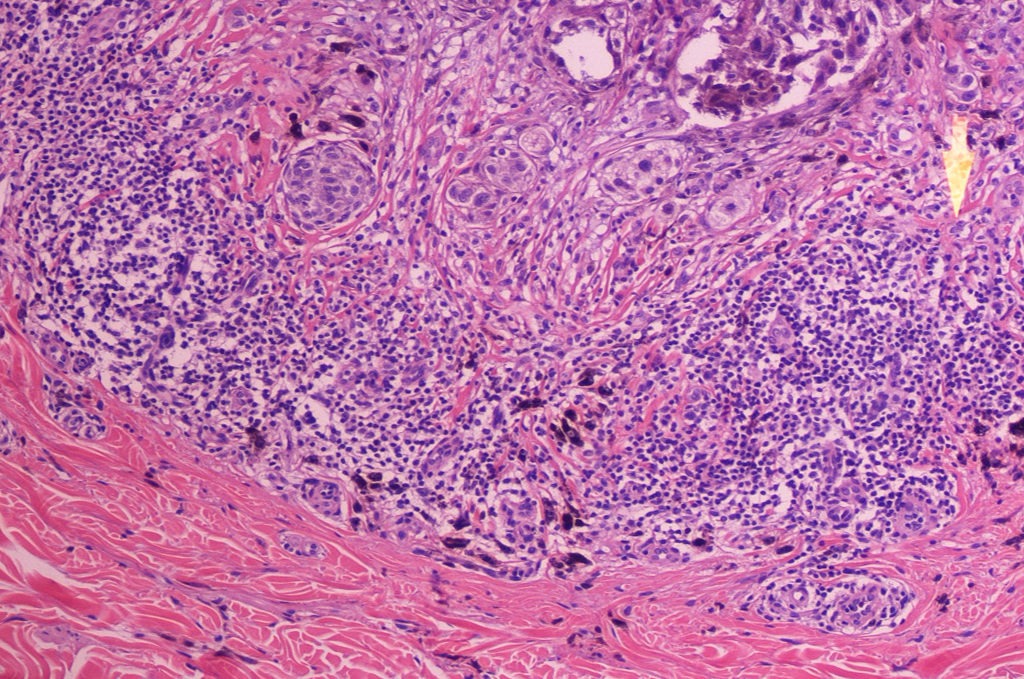
Histologic image of melanoma nests invading the epidermis and the dermis, surrounded by a dense inflammatory infiltrate (yellow arrow pointing at the inflammation).
Describing the significance of this study, Professor William Gallagher, Director of BREAST-PREDICT UCD said, “This research highlights that this type of comprehensive, genome-wide DNA methylation mapping can provide insight to the transformation and aggressiveness of tumour cells. It has allowed us to identify a DNA methylation signature associated with patient survival and we are excited by the potential clinical utility of these biomarkers. They may provide clinicians with a powerful tool to stratify patients who have benign versus more aggressive tumour types and allow them to tailor treatment accordingly.”
According to Dr Manel Esteller (Bellvitge Biomedical Research Institute, Barcelona), co-lead author on the study, “This study represents the most comprehensive epigenomic profiling assessment of well-described human melanomas. It verifies that DNA methylation biomarkers represent a valuable tool to identify potential protein biomarkers. This not only has implications for the clinical management of melanoma but several cancer types.”
Dr Jasper Wouters, first author of the study and postdoctoral fellow in KU Leuven, says, “In this epigenomic melanoma study, we establish novel biomarkers to identify patients with good prognosis that do not necessarily need to undergo aggressive and expensive therapies. Importantly, some of these biomarkers can potentially be assessed non-invasively, using cell-free DNA in the serum of patients.”
The study is published in the journal BMC Medicine and is available here
Journal reference: Wouters et al. Comprehensive DNA methylation study identifies novel progression-related and prognostic markers for cutaneous melanoma. BMC Medicine DOI: 10.1186/s12916-017-0851-3
This work was funded by BREAST-PREDICT, the Irish Cancer Society Collaborative Cancer Research Centre (CCRC13GAL), SYS-MEL (FP7 project, reference 611107), RATHER (FP7 project, reference 258967), MEL-PLEX (H2020 Marie Curie Actions, reference 642295) and OPTi-PREDICT (Science Foundation Ireland Investigator Programme, grant code 15/IA/3104).
Press release produced by Elaine Quinn, Institute Manager (Education and Outreach), UCD Conway Institute
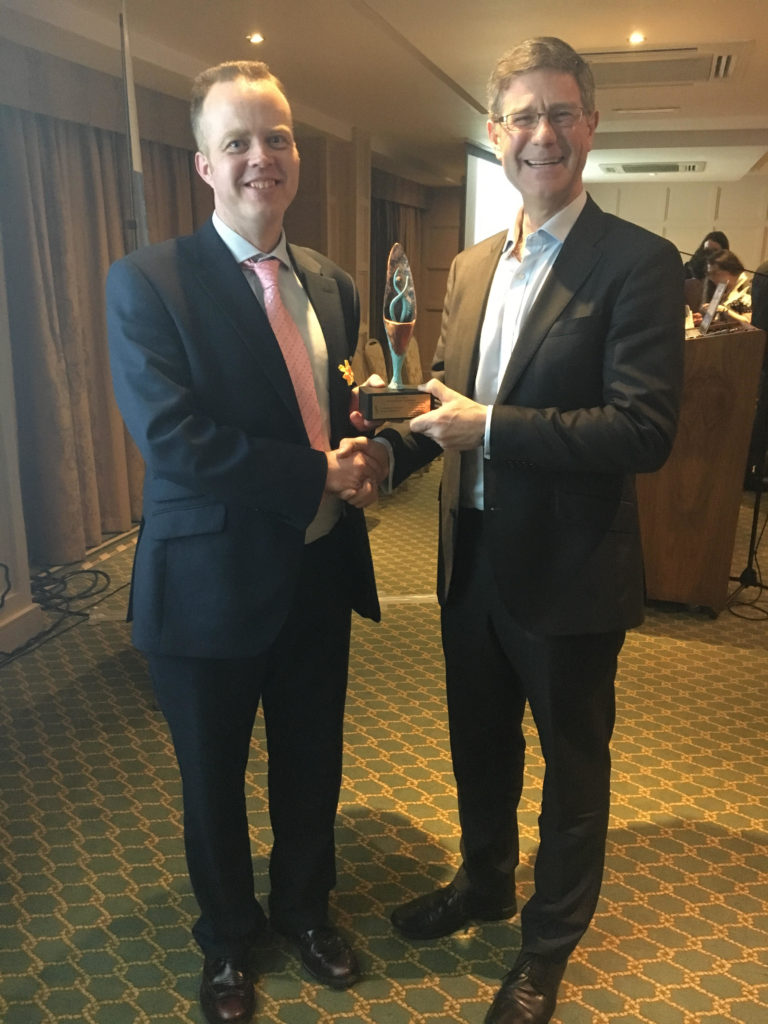
William Gallagher, who was the inaugural recipient of the Irish Association of Cancer Research (IACR) Cancer Research Medal at the annual IACR Conference held in Kilkenny on 22nd-24th February 2017. This prestigious award recognises his significant contribution to the cancer research community in Ireland throughout his career.
Presenting the award on the night was Professor William Watson, President of the IACR, who described the outstanding contribution of Professor Gallagher to the Irish cancer research community over the years. Highlighted in particular was his early understanding of the importance of commercialisation of research outputs, and protection of intellectual property, when research and development activities in Ireland were still in their infancy. Professor Gallagher is the co-founder and Chief Scientific Officer of OncoMark Ltd., which is focused on the development and application of biomarker panels for cancer, primarily aimed at identifying risk of recurrence. In 2016, the company was awarded €2.75 million from the EU Horizon 2020 SME Instrument programme to clinically validate a prognostic test for breast cancer, called OncoMasTR, which is based on a panel of genetic ‘drivers’ of breast cancer. OncoMark recently secured a further €2.1 million in investment to support the commercial development of this assay, which they plan to launch in 2018.
Accepting his award, Professor Gallagher thanked his peers and mentors, and gave his perspective on the cancer research ecosystem in Ireland, in his talk ‘Cancer (Research) in Ireland: Past, Present and Future’. He described the past contributions of unsung heroes of Irish cancer research, such as Dr. Denis Burkitt, who first discovered Burkitt’s Lymphoma, and Dr. Mary Cole, who co-authored the first clinical study on the use of tamoxifen in treating breast cancer patients, in 1971. He went on to highlight the exceptional quality of cancer research ongoing in Ireland today, with high-impact publications, increasing rates of participation in clinical trials and excellent training programmes in place for up-and-coming researchers.
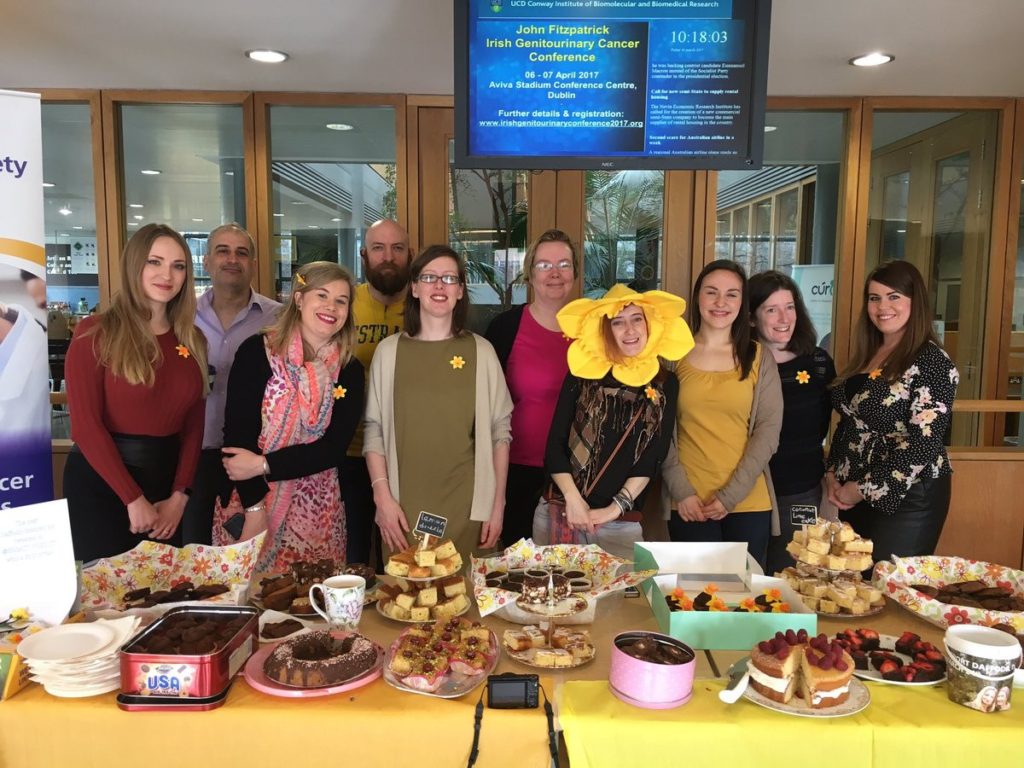
The 24th March 2017 marked the 30th Anniversary of the Irish Cancer Society Daffodil Day in Ireland. As well as funding important cancer research in Ireland, this annual fundraising event is critical to ensure vital funds are raised for a number of Irish Cancer Society services such as the nurse-line; the night-nurse service, and volunteer drivers. The BREAST-PREDICT team get involved in this event every year by holding a number of fundraising events nation-wide. This year, the team in UCD Conway Institute held a bake-sale and raffle on the day and raised a massive €914. Thanks to all who donated!
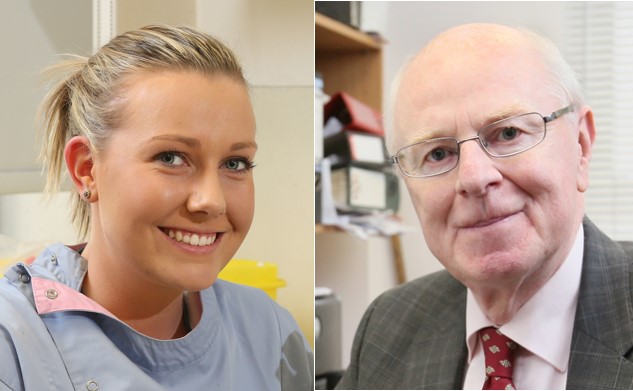
Exciting new research which was recently carried out by PhD student Naoise Synnott, Professor Joe Duffy, and Professor John Crown at St Vincent’s University Hospital and UCD, has identified a potential novel treatment for triple negative breast cancer. This type of breast cancer lacks three important biomarkers namely, estrogen receptor, progesterone receptor and HER2, meaning that it cannot be treated with either hormone therapy (e.g. tamoxifen) or Herceptin. This makes this type of caner the most difficult to treat, with chemotherapy being the only current form of treatment for these patients.
Now, the BREAST-PREDICT team have identified a treatment that specifically targets p53, a gene which is responsible for driving breast cancer growth, and is the most frequently altered gene in breast cancer. In particular, it is altered in almost all cases of triple-negative breast cancer.
In a study recently published in the International Journal of Cancer and funded by both BREAST-PREDICT and the Clinical Cancer Research Trust, the team have shown that a new drug, known as APR-246, which acts by correcting or neutralising the mutant form of p53, can inhibit the growth of triple-negative breast cancer cells grown in the laboratory.
Importantly, the St Vincent’s/UCD group now hope that APR-246 can be tested in clinical trials in patients with triple negative breast cancer.
Full details of this study can be found here
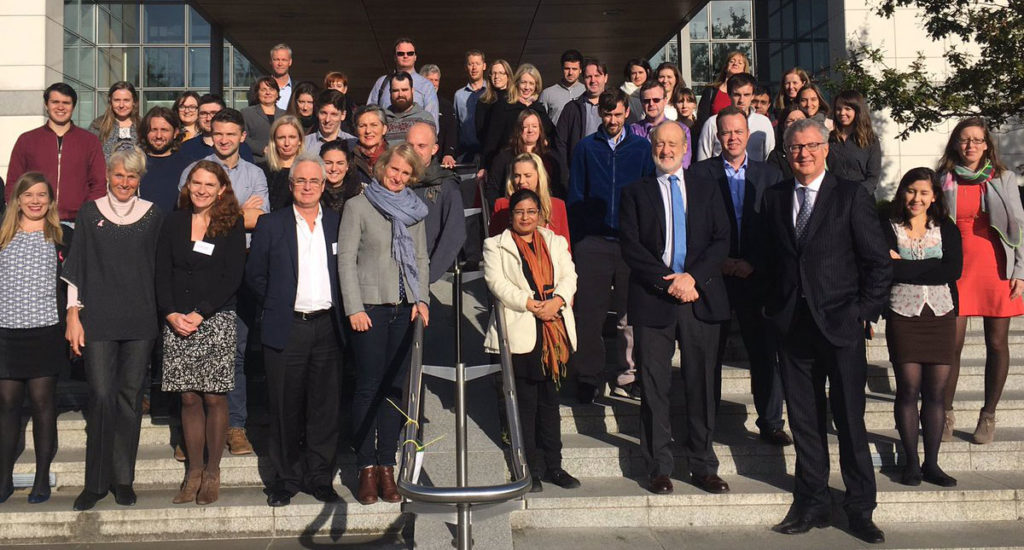 BREAST-PREDICT are regularly advised by our independent scientific advisory board (SAB) which has previously included seven leading international scientists in the oncology field: Dr. Garrett Hampton, Genentech, U.S.A.; Prof. Richard Kennedy, Queen’s University Belfast, U.K.; Prof. Ursula Klingmüller, Heidelberg, Germany; Prof. Robert Clarke, Georgetown University, U.S.A.; Dr. Jason Carroll, Cambridge Research Institute, U.K.; Prof. Mats Lambe, Karolinska Institute, Sweden; and Prof. Liam Murray, Queen’s University Belfast, U.K.
BREAST-PREDICT are regularly advised by our independent scientific advisory board (SAB) which has previously included seven leading international scientists in the oncology field: Dr. Garrett Hampton, Genentech, U.S.A.; Prof. Richard Kennedy, Queen’s University Belfast, U.K.; Prof. Ursula Klingmüller, Heidelberg, Germany; Prof. Robert Clarke, Georgetown University, U.S.A.; Dr. Jason Carroll, Cambridge Research Institute, U.K.; Prof. Mats Lambe, Karolinska Institute, Sweden; and Prof. Liam Murray, Queen’s University Belfast, U.K.
This year the BREAST-PREDICT team decided that our programme would greatly benefit from new additional members with different areas of expertise. Therefore, we invited four new members to join our SAB in Year 3 (in addition to the original seven): Prof. Robert Coleman, a medical oncologist at the University of Sheffield who will bring his expertise in clinical cancer research; Prof. Anne-Lise Børresen-Dale, University of Oslo who has expertise with expression profiling of breast carcinomas; Prof. Klaus Pantel, at the University Medical Center Hamburg-Eppendorf who’s research focuses on liquid biopsies and circulating tumour DNA; and Dr. Pernette J. Verschure at the Swammerdam Institute for Life Sciences, Amsterdam with expertise in the area of epigenomics in breast cancer.
On 20th September 2016, we held our third annual SAB meeting with approximately 45 researchers and 5 SAB members in attendance (including 3 new members). This was an excellent meeting, and included talks from 14 team members, 14 posters, and 5 moderated posters. The SAB are very satisfied with our progress to date, and gave us very useful feedback to help us plan for the remaining success of BREAST-PREDICT during the final two years of our research programme.
In cancer, EVs are small vesicles containing protein and nucleic acids released by tumours into biological fluid such as blood, where the TCD group have shown that they can transfer their contents to new cells and so contribute to tumour progression, cancer metastasis and spreading of drug resistance. Interestingly, the contents of EVs can be very similar to the cells that they come from and so they may represent important tools as cancer biomarkers. Additionally, the potential use of EVs to use as novel delivery vehicles for cancer therapeutics is also being explored, further highlighting the important role these vesicles may play in cancer research.
The BREAST-PREDICT researchers in TCD identified a group of microRNAs(short sequences of genetic information that are important for controlling gene expression)whose levels were substantially reduced in cells and EVs from a very aggressive TNBC cell line compared to a more docile counterpart. Notably, it was found that the microRNA profile of EVs were very similar to their cells of origin – supplying further evidence for the benefit of EVs as breast cancer biomarkers. In keeping with this, the authors also found that the levels of miR-134, the most significantly down-regulated microRNA in the aggressive TNBC cells and their EVs, was also reduced in tumour samples from breast cancer patients when compared to normal breast tissue. Further studies identified that the delivery of miR-134 to TNBC-derived cells reduced the aggressiveness of the cancer cells.
While further research is required, this novel study supports a potential role for EVs and also their miR-134 content as a potential biomarker and novel treatment approach for TNBC. It gives hope that assessing EV quantities and their contents, taken from small blood samples donated by patients, can contribute to better ways of diagnosing breast cancer and may also help develop new ways for its treatment.
For full details on this publication, click here.
BREAST-PREDICT Team hold Second Successful Scientific Advisory Board Meeting
The BREAST-PREDICT team met with members of their Scientific Advisory Board (SAB) on the 11th of September 2015 in UCD. Approximately 45 researchers met with four out of seven members of the Scientific Advisory Board to discuss key developments from year two of the centre’s research programme and to gain advice on future plans. The Scientific Advisory Board members in attendance were Prof. Robert Clarke, Georgetown University, U.S.A.; Dr. Jason Carroll, Cambridge Research Institute, U.K; Prof. Richard Kennedy, Queen’s University Belfast, U.K; and Prof. Liam Murray, also from Queen’s University Belfast.
Ten researchers presented updates on the five different workpackages, sixteen early-stage researchers displayed posters and five researchers presented oral posters to the group. This was followed by an informative discussion session in which members of the Scientific Advisory Board provided feedback to the BREAST-PREDICT team. Overall this was a very enjoyable and productive meeting and we look forward to future discussions and feedback at the end of year three.
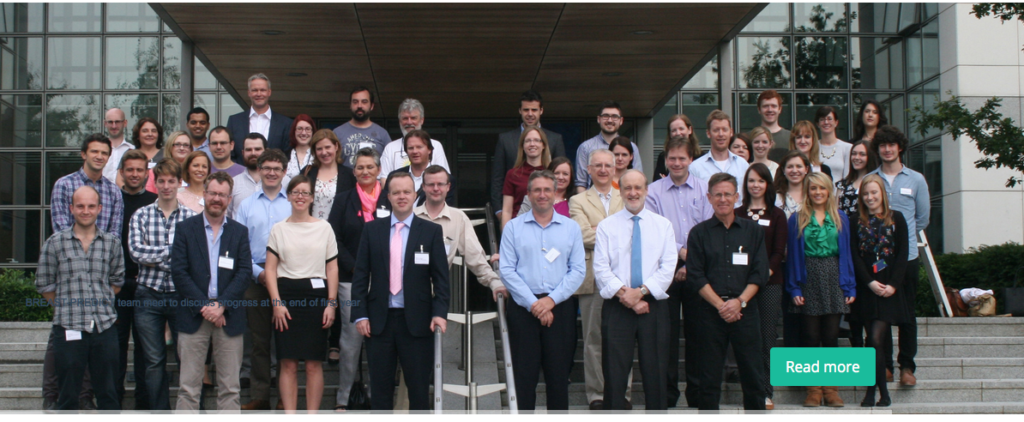
July 2015
BREAST-PREDICT team take part in Irish Cancer Society Colour Dash 2015

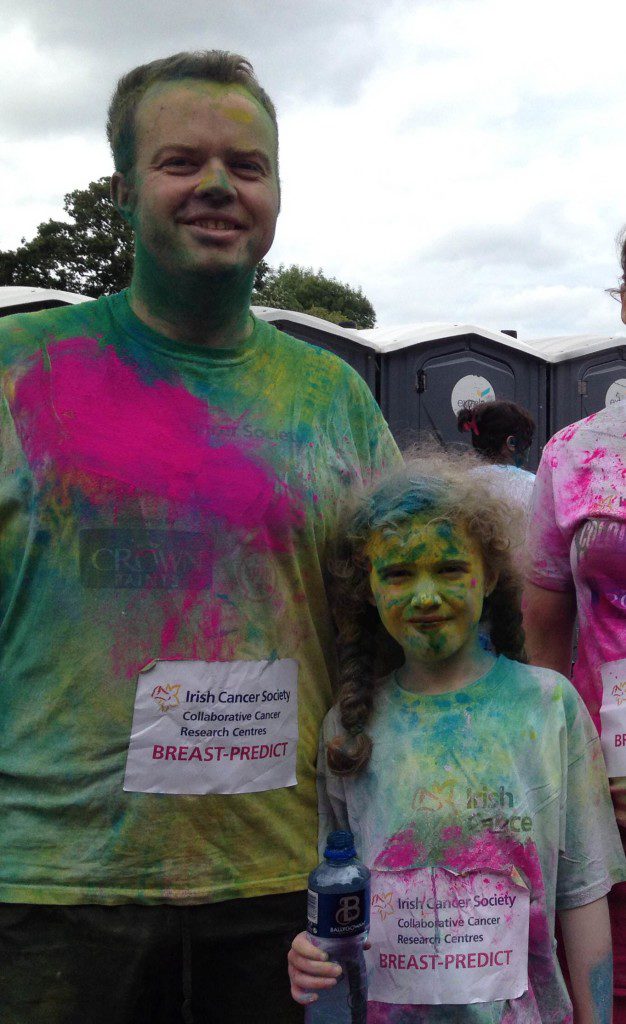

Members of the BREAST-PREDICT team took part in the Irish Cancer Society Colour Dash 5km fun run in July 2015 to raise funds for the work the Society does in supporting patient services and cancer research.
February 2015
Cancer Research – Past, Present and Future
UCD-based cancer researchers also gathered on World Cancer Day, 4th February 2015, for a coffee morning and a break from all their hard work!
WCD2015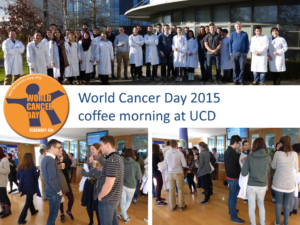
About World Cancer Day
World Cancer Day is an initiative of the Union for International Cancer Control (UICC), the leading international non-governmental organisation that unites the cancer community to reduce the global cancer burden, to promote greater equity, and to integrate cancer control into the world health and development agenda. Founded in 1933 and based in Geneva, UICC is composed of more than 800 organisations across 155 countries, features the world’s major cancer societies, ministries of health, research institutes, treatment centres and patient groups.
World Cancer Day is a unique opportunity to encourage everyone affected by cancer to recognise the role they can play in reducing the burden of the disease and ultimately reduce premature deaths from cancer by 25% by 2025.
BREAST-PREDICT win at Irish Laboratory Awards
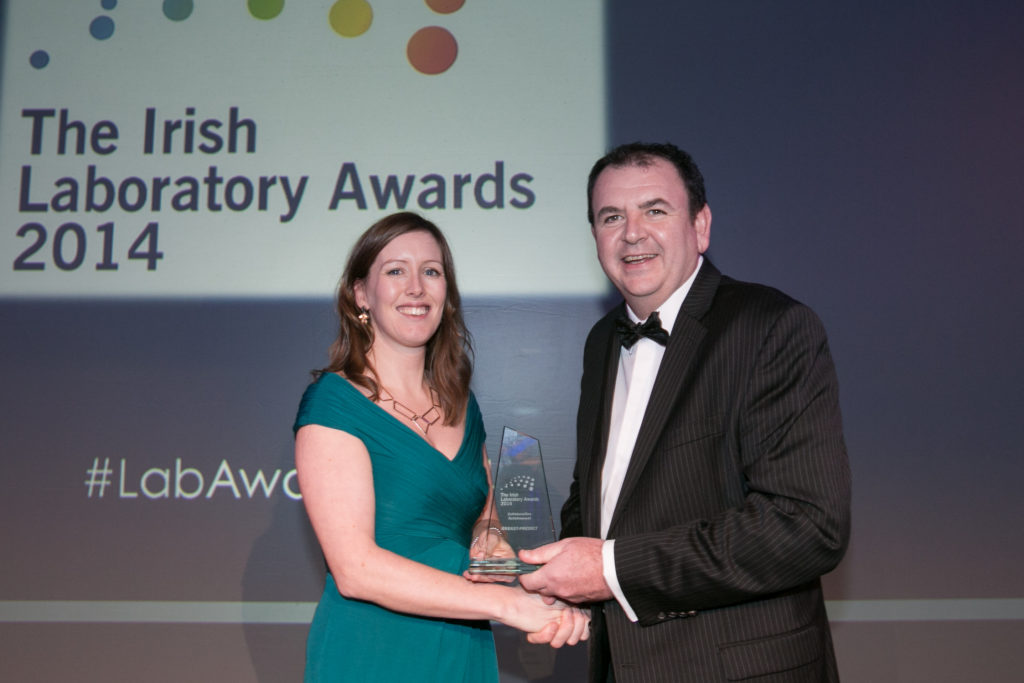
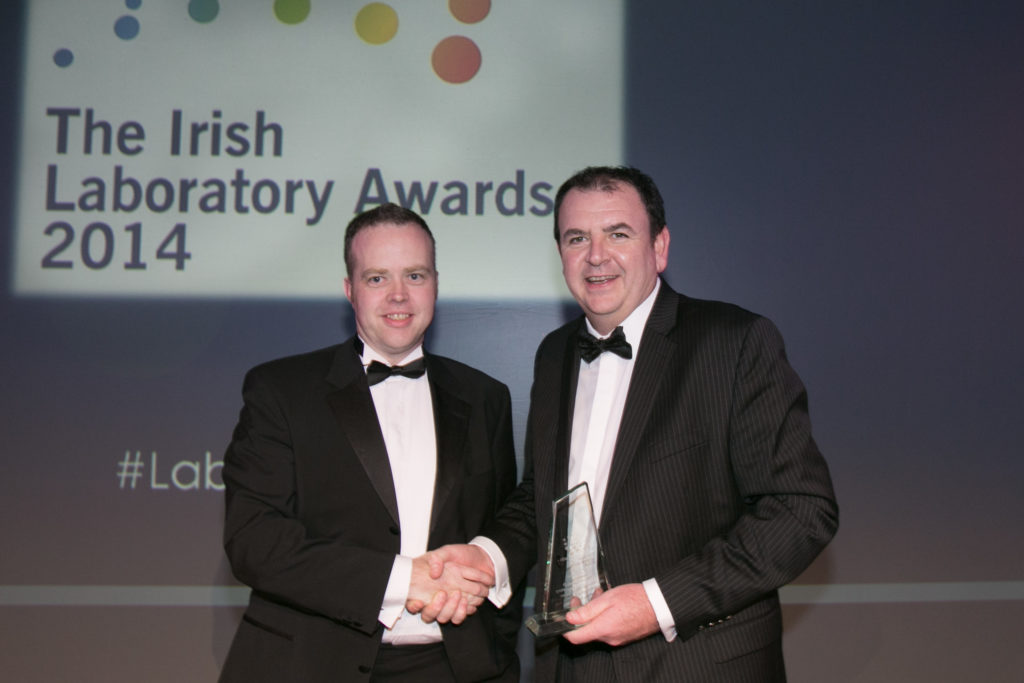 s
s
The Irish Cancer Society Collaborative Cancer Research Centre BREAST-PREDICT team were presented with the ‘Collaborative Achievement’ Award at the recent Irish Laboratory Awards night, held in the Doubletree by Hilton hotel on the 3rd December 2014. Comedian Neil Delamere was the host for the event, which aims to recognise excellence and achievement in the laboratory environment. The BREAST-PREDICT team were recognised for their achievement in bringing together a large multidisciplinary group of top-class researchers from around Ireland, to work towards a common goal – developing a personalised approach to breast cancer care in Ireland. The award was presented by Dermot Harrington of Antech Solutions, sponsors of the event, and was accepted by the Centre Manager, Dr. Fiona Lanigan, on behalf of the BREAST-PREDICT team. Director of the Centre, Prof. William Gallagher, and Principal Investigator Dr. Darran O’Connor were also awarded the prize for ‘Best Laboratory Team of the Year’ for their research group, the Cancer Biology and Therapeutics Laboratory in UCD.
September 2014
BREAST-PREDICT team meet to discuss progress at the end of first year.

The BREAST-PREDICT team met with members of their Scientific Advisory Board (SAB) on the 5th of September in UCD. The purpose of this meeting was to allow the group to highlight their research achievements in the first year of the Centre, and to benefit from the expertise of the Scientific Advisory Board in guiding future plans. Five of the seven board members attended this first meeting, including Prof. Robert Clarke of Georgetown University, an expert in the area of endocrine resistance in breast cancer; Dr. Garret Hampton, Head of Oncology Biomarker Development in Genentech; Prof. Mats Lambe, an expert in Medical Epidemiology from the Karolinska Institute in Sweden; Prof. Richard Kennedy, a Consultant Medical Oncologist from Queen’s University Belfast (QUB), and Prof. Liam Murray, an expert in Public Health and Epidemiology, also from QUB.
The BREAST-PREDICT team spent the morning presenting their research to the SAB, followed by a poster session at lunchtime where PhD students and postdoctoral fellows discussed their work. The afternoon was given over to an engaging discussion on progress, with specific feedback given by the SAB on each research area, in addition to general advice on future directions. Both the SAB and the BREAST-PREDICT team enjoyed the meeting, and we are looking forward to renewed discussions at the end of Year 2.
August 2014
BREAST-PREDICT Researchers shed light on how aspirin works to reduce cancer deaths.
BREAST-PREDICT Researchers have discovered that women who had been prescribed aspirin regularly before being diagnosed with breast cancer are less likely to have cancer that spread to the lymph-nodes than women who were not on prescription aspirin. These women are also less likely to die from their breast cancer. The study of Irish patients, published by the American Association for Cancer Research in the Journal, Cancer Research, analyses records from the National Cancer Registry Ireland (NCRI), and prescription data from the General Medical Service (GMS) pharmacy claims database. This study was funded by the Health Research Board and the Irish Cancer Society.
‘Our findings suggest that aspirin could play a role in reducing mortality from breast cancer by preventing the cancer spreading to nearby lymph nodes’, says Dr Ian Barron, the lead author, who carried out the research at Trinity College Dublin, and is now working at Johns Hopkins, USA. ‘We analysed data from 2,796 women with stage I-III breast cancer. We found that those women prescribed aspirin in the years immediately prior to their breast cancer diagnosis were statistically significantly less likely to present with a lymph node-positive* breast cancer than non-users. The association was strongest among women prescribed aspirin regularly and women prescribed higher aspirin doses. We now need to establish how and why this is the case’. The findings are consistent with two other major studies. The first is an analysis of cardiovascular trials where pre-diagnostic aspirin use was associated with a statistically significant reduction in the risk of developing metastases and dying from cancer.
The second is an observation from in vivo breast cancer models, which suggest a possible mechanism by which aspirin may reduce the risk of cancer spreading to other parts of the body. Prof Kathleen Bennett, a co-author from the Department of Pharmacology & Therapeutics, Trinity College Dublin said; ‘Our study was observational and these results do not mean that women should start taking aspirin as a precautionary measure. Aspirin can have serious side effects. We still need to identify exactly how aspirin may prevent breast cancer from spreading to the lymph nodeswhich women, or types of breast cancer, are most likely to benefit from taking aspirin; as well as what the optimum doses might be.
Research to help answer the next questions is funded by the Irish Cancer Society as part of its first National Collaborative Cancer Research Centre, BREAST-PREDICT’. Dr Graham Love, Chief Executive of the Health Research Board said, ‘These results have great potential to help improve our understanding of how to increase Irish and global survival rates from breast cancer’.
To hear Prof. Bennett talk about this research on RTE Radio 1, click here.
May 2014
Professor John Fitzpatrick – R.I.P

The BREAST-PREDICT team are deeply saddened to learn of the sudden passing of Professor John Fitzpatrick. Professor Fitzpatrick was Head of Research at the Irish Cancer Society, the first to occupy the position which he took up in July 2011. Professor Fitzpatrick’s appointment marked a new era in cancer research in Ireland. His passion, dedication and drive ensured cancer research became a cornerstone of the Irish Cancer Society in the fight against cancer. He led the process which brought together Irish and world experts in a collaboration of the brightest minds.
Urology and of the British Association of Urological Surgeons.
Professor Fitzpatrick will be greatly missed by his colleagues and friends and we extend our deepest sympathies to his family.
April 2014
The Irish Cancer Society announce funding for a new CCRC, joint-funded by SFI
The Irish Cancer Society have partnered with SFI to fund a second Collaborative Cancer Research Centre (CCRC), and are currently calling for proposals. This Centre will build on the substantial national investment in biomedical research to date, and will be expected to become a world-leading Research Centre that delivers excellence with impact. The CCRC will bring together translational, clinical and population health researchers from the field of cancer with researchers from areas such as engineering and ICT to leverage powerful interdisciplinary synergies, with the aim of developing new insights into cancer and delivering new approaches to treatment. CCRC proposals must focus on unmet medical needs within the area of cancer and must establish partnerships with industry and other major stakeholders, to drive the research towards the development of new approaches and advances to reduce the economic and social burden of cancer in Ireland. More information can be found here.————
————–BREAST-PREDICT take part in UCD Relay for Life

Members of the BREAST-PREDICT team took part in the 2014 UCD ‘Relay for life’ event, organised by UCD students and held in Devlin Park in UCD on April 9th-10th.
The aim of Relay for Life is to raise money for the Irish Cancer Society, to raise awareness about cancer and to show support and solidarity with individuals and their families who have been affected by the disease. The event ran as a relay of walkers and runners circling the track over24 hours, from 2pm on Wednesday until 2pm the following day. The event opened with a Survivors Lap, with team members or their family and friends who have suffered from cancer walking a lap of honour in celebration and hope. At dusk that evening, the Candle of Hope Ceremony was held to remember and celebrate loved ones who have been affected by cancer. During the event, information talks on the latest in cancer research were given by Dr. Amanda McCann on breast cancer, Prof. Bill Watson on prostate cancer, and Dr. Fiona Lanigan from BREAST-PREDICT, who talked about the latest research initiative funded by the Irish Cancer Society.
March 2014
BREAST-PREDICT team meet young scientists of the future
BREAST Predict director Prof. William Gallagher recently paid a visit to some of our very youngest budding scientists at Notre Dame Junior School in Dundrum. Together with PhD researcher Bo Li, he introduced the pupils to the fascinating world of science!
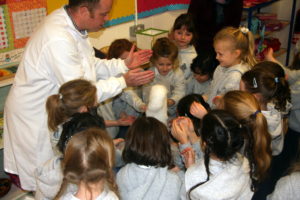

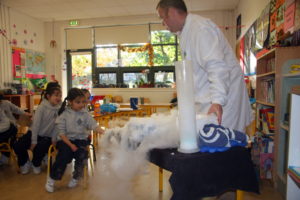
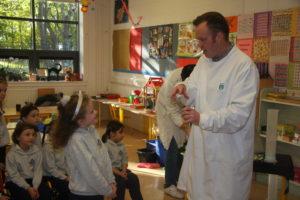
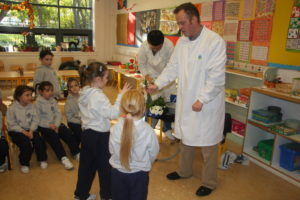

———————————————
BREAST-PREDICT Researcher wins award for research communication
Killian Making an Impact
Congratulations to BREAST-PREDICT PhD student Killian O’Brien, who recently scooped a top prize worth €2,500 at the HEA Making an Impact competition, held in The Helix in DCU on the 12th March 2014. The main objective of this competition is the effective communication of research to a lay audience, in this case secondary school students from around Ireland.
Killian, who is a biochemistry graduate from UCC, is involved in research at NUI Galway aimed at earlier detection of breast cancer, together with his supervisor Dr. Roisin O’ Dwyer. This ground-breaking work is focused on the use of a simple blood test to identify the presence of tiny molecules, called microRNAs, that can indicate the presence of breast cancer, allowing for earlier and non-invasive detection and early treatment of the disease.Killian’s presentation was streamed live to schools and laboratories around Ireland, and can be viewed here.
————————————————
BREAST-PREDICT team support Daffodil Day 2014

The Irish Cancer Society’s annual Daffodil Day takes place on 28th March 2014, when thousands of volunteers around Ireland sell daffodil pins and flowers to raise money for the Society. As well as funding cancer research around Ireland, including the Collaborative Cancer Research Centre BREAST-PREDICT, the Society provides free support services for those with, and affected by, cancer in Ireland.
Research facilitated by leading charity, Breast Cancer Campaign, has identified the ten critical gaps that exist in breast cancer research, which, if not urgently addressed, could see the loss of around 185,000* lives in the UK by 2030.
This landmark research paper, published in the October issue of the international open access journal, Breast Cancer Research, is a unique collaboration of over 100 internationally recognised scientists, clinicians and healthcare professionals, including BREAST-PREDICT researchers Professor William Gallagher, University College Dublin; Professor Bryan Hennessy, Irish Co-operative Oncology Research Group; Professor Rosemary O’ Connor, University College Cork, and Professor Leonie Young, Royal College of Surgeons Ireland.
Co-authored by Professor Sue Eccles, The Institute of Cancer Research, London, and Professor Alastair Thompson, University of Dundee, the Gap Analysis 2013 is the most comprehensive review of breast cancer research to have ever taken place and provides us with what we need to know and what we need to do to overcome – prevent, cure and outlive – breast cancer by 2050.
The top ten gaps have been identified and prioritised in key areas, such as genetics, prevention, diagnosis, treatment and support, which, if overcome, will have a significant impact on the lives of those affected. Critical gaps include:
- Understanding how genetic changes lead to the development of breast cancer.
- Identifying sustainable lifestyle changes, such as diet and exercise, which can reduce a woman’s risk of breast cancer, as well as improving risk-reducing drugs (chemoprevention) for women at increased risk of the disease.
- Targeting breast screening to those who will most benefit, by finding accurate and practical ways to calculate someone’s individual risk of developing breast cancer.
- Understanding the molecules and processes that encourage different types of breast cancer to grow, and those that allow breast tumours to become resistant to treatments and spread throughout the body.
- Understanding how cancer cells with different characteristics form within a tumour, why cancer cells sometimes go into hibernation, and why some breast cancers are resistant to treatment from the outset whereas others become resistant over time.
- Developing tests to predict how well patients will respond to chemotherapy or radiotherapy.
- Understanding how to use combinations of drugs and other therapies to improve and tailor treatment for each individual.
- Developing better ways of using imaging to diagnose breast cancer, track how the disease responds to treatments and monitor its spread throughout the body.
- Providing effective and practical support to help people deal with the emotional impact of breast cancer and the side effects of treatment.
- Collecting tumour tissue and blood samples donated by breast cancer patients at different stages of their disease, alongside detailed anonymous information about each patient, to help study the disease and develop new treatments.
In addition, the paper identifies five key strategic solutions to these gaps to help treat and support those impacted by breast cancer and ultimately help more women to prevent and overcome the disease:
- Reverse the decline in resources targeted towards breast cancer research. Funding must be increased and strategically directed to enhance our current knowledge, develop the talent pool, and apply evidence-based findings to improve clinical care.
- Develop a fully cohesive and collaborative infrastructure to support breast cancer research, including access to appropriate, well-annotated clinical material such as longitudinal sample collection with expert bioinformatics support and data sharing.
- Find better ways to study breast cancer and test treatments in the laboratory, and identify accurate methods to use in clinical practice to predict how patients respond to treatments.
- Encourage collaboration between researchers in different scientific fields, including computer technology, physics and engineering, and support clinicians to do research.
Improve clinical trial design to better meet the complexity of modern treatment options and involve patients in the design process.
Crucially, the Irish Cancer Society BREAST-PREDICT Collaborative Cancer Research Centre is already focused on addressing some of these pressing research questions. One of the main aims of the Centre is to centralise and integrate existing Irish breast cancer biobank databases, in order to create a cohesive, well-annotated national biobank and database. The collaborative approach of the BREAST-PREDICT Centre, bringing together experts in many different fields, has been proposed by the authors of this study as the optimum approach for breast cancer researchers to make the best use of increasingly complex data, essential for future advances.
The Gap Analysis article is available to download at Breast Cancer Research.
*Projected total number of female deaths from breast cancer in the UK from 2014-2030. Calculated by the Statistical Information Team at Cancer Research UK, September 2013 based on data from Sasieni P, et al. Cancer mortality projections in the UK to 2030 (unpublished). Analyses undertaken and data supplied upon request; September 2012. Similar data can be found on the Cancer Research UK website.
September 2013: Inaugural MTCI/BREAST-PREDICT Translational Cancer Research Seminar
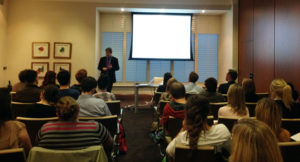
The Inaugural MTCI/BREAST-PREDICT Translational Cancer Research Seminar was held in the Herbert Park Hotel, Ballsbridge, on Wednesday 25th September 2013. This seminar series is a joint initiative between the Science Foundation Ireland-funded Strategic Research Cluster Molecular Therapeutics for Cancer Ireland (MTCI), the Irish Cancer Society Collaborative Cancer Research Centre BREAST-PREDICT and the National Cancer Research Centre of Ireland (NCRCI), and the first event was chaired by Professor John Crown, Director of MTCI, and Professor William Gallagher, Director of BREAST-PREDICT.
The guest speaker was Professor Richard Kennedy, the McClay Chair of Experimental Medicine at the Centre for Cancer Research & Cell Biology, Queen’s University Belfast. Professor Kennedy is a Consultant Medical Oncologist with research interests in the area of biomarker development and drug target identification, and is also Vice-President and Medical Director at Almac Diagnostics. He discussed the future of cancer biomarkers in the clinic in his talk entitled “Transcriptional-Based Biomarkers for Cancer Patient Management”.
August 2013: Launch of Irish Cancer Society Collaborative Cancer Research Centre, BREAST-PREDICT

Breast cancer researchers, Irish Cancer Society fundraisers and patient advocates gathered in the Conrad Hotel, Dublin, for the launch of the Irish Cancer Society’s first Collaborative Cancer Research Centre, BREAST-PREDICT, on Thursday 29th August 2013.
The Irish Cancer Society has brought together Ireland’s leading breast cancer researchers in a new five year collaboration that aims for better treatments for breast cancer in Ireland. BREAST-PREDICT, which will see an investment by the Society of €7.5 million over the next five years, is the country’s first Collaborative Cancer Research Centre which involves most of Ireland’s leading breast cancer researchers from a range of disciplines and a number of leading academic institutions. They will share their resources and expertise in a project designed to predict the best treatment options for breast cancer patients.
The Society is making the substantial investment of €1.5 million per year, for up to five years, to join six research institutions and ICORG in a national collaboration, bringing together the expertise and support of several pre-existing entities in the areas of population-based, translational and clinical cancer research. All eight clinical cancer centres of excellence are on board.
Over fifty leading Irish and world experts in breast cancer research will work towards and benefit from a common research goal, which will provide centralized access to resources, particularly patient samples, and technical expertise. This will lead to an integrated breast cancer database and modelling of virtual cancer patients to track prognosis and therapy response.
The first Irish Cancer Society Collaborative Cancer Research Centre will harness biological information to redefine how breast cancer is treated, with the ultimate goal of precision therapy – that is, more accurate and personalised approaches.
BREAST-PREDICT will leverage the power of systems medicine or ‘holistic’ approaches to improve understanding of response and resistance to treatments, and tackle key factors which are hampering international progress in the breast cancer research arena, such as access to tumour samples collected from the same patient over time to look at how tumours adapt, and improved insight into signalling networks within tumours.
Commenting on the announcement, Director of the Irish Cancer Society Collaborative Cancer Research Centre BREAST-PREDICT, UCD Professor William Gallagher said, “The Collaborative Cancer Research Centre will for the first time in Ireland harness the wealth of data available on breast cancer from around the globe to inform new clinical trials and treatments, and link in with world leading scientists and intuitions such as the Dana-Farber Cancer Institute in Boston and the Cambridge Research Institute in the UK. The ultimate goal of this research is personalised medicine, which allows us to tailor therapy towards individual patients based on the characteristics of their particular tumour and, thus, improve outcomes for breast cancer patients both in Ireland and worldwide.”
He added, “We are most grateful to the Irish Cancer Society for their incredibly generous support as we strive to work together as a critical mass in the battle against breast cancer, and deliver initial and hopefully important research findings in our first year.”
Head of Research at the Irish Cancer Society, Prof John Fitzpatrick said, “The Collaborative Cancer Research Centre is by far the biggest thing the Irish Cancer Society has ever done in the area of cancer research in Ireland. BREAST-PREDICT is the first in a series of such Centres that will lead large-scale international collaborative projects in the oncology area.”
He added, “I’m very proud to say the €7.5 million investment by the Society has come entirely from fundraising, in part due to worthwhile Breast Cancer Awareness Month initiatives such as the Get the Girls appeal. We need ongoing support to fulfill our strategy to introduce new centres that will deliver excellent research for the benefit of patients, and we encourage the public to share in this goal by fundraising on behalf of the Irish Cancer Society this October.”
The Irish Cancer Society has contributed more than €30 million to cancer research since 1963. During that period, more than 650 important research findings have been made.
For further information or for any questions about this funding, please contact the Irish Cancer Society research team on research@irishcancer.ie. For further information on the Irish Cancer Society’s research programme, Collaborative Cancer Research Centre or to make a donation, visit www.cancer.ie or contact the Irish Cancer Society on Call Save 1850 60 60 60.
BREAST-PREDICT researchers involved in study to identify critical gaps in breast cancer research
Research facilitated by leading charity, Breast Cancer Campaign, has identified the ten critical gaps that exist in breast cancer research, which, if not urgently addressed, could see the loss of around 185,000* lives in the UK by 2030.
This landmark research paper, published in the October issue of the international open access journal, Breast Cancer Research, is a unique collaboration of over 100 internationally recognised scientists, clinicians and healthcare professionals, including BREAST-PREDICT researchers Professor William Gallagher, University College Dublin; Professor Bryan Hennessy, Irish Co-operative Oncology Research Group; Professor Rosemary O’ Connor, University College Cork, and Professor Leonie Young, Royal College of Surgeons Ireland.
Co-authored by Professor Sue Eccles, The Institute of Cancer Research, London, and Professor Alastair Thompson, University of Dundee, the Gap Analysis 2013 is the most comprehensive review of breast cancer research to have ever taken place and provides us with what we need to know and what we need to do to overcome – prevent, cure and outlive – breast cancer by 2050.
The top ten gaps have been identified and prioritised in key areas, such as genetics, prevention, diagnosis, treatment and support, which, if overcome, will have a significant impact on the lives of those affected. Critical gaps include:
- Understanding how genetic changes lead to the development of breast cancer.
- Identifying sustainable lifestyle changes, such as diet and exercise, which can reduce a woman’s risk of breast cancer, as well as improving risk-reducing drugs (chemoprevention) for women at increased risk of the disease.
- Targeting breast screening to those who will most benefit, by finding accurate and practical ways to calculate someone’s individual risk of developing breast cancer.
- Understanding the molecules and processes that encourage different types of breast cancer to grow, and those that allow breast tumours to become resistant to treatments and spread throughout the body.
- Understanding how cancer cells with different characteristics form within a tumour, why cancer cells sometimes go into hibernation, and why some breast cancers are resistant to treatment from the outset whereas others become resistant over time.
- Developing tests to predict how well patients will respond to chemotherapy or radiotherapy.
- Understanding how to use combinations of drugs and other therapies to improve and tailor treatment for each individual.
- Developing better ways of using imaging to diagnose breast cancer, track how the disease responds to treatments and monitor its spread throughout the body.
- Providing effective and practical support to help people deal with the emotional impact of breast cancer and the side effects of treatment.
- Collecting tumour tissue and blood samples donated by breast cancer patients at different stages of their disease, alongside detailed anonymous information about each patient, to help study the disease and develop new treatments.
In addition, the paper identifies five key strategic solutions to these gaps to help treat and support those impacted by breast cancer and ultimately help more women to prevent and overcome the disease:
- Reverse the decline in resources targeted towards breast cancer research. Funding must be increased and strategically directed to enhance our current knowledge, develop the talent pool, and apply evidence-based findings to improve clinical care.
- Develop a fully cohesive and collaborative infrastructure to support breast cancer research, including access to appropriate, well-annotated clinical material such as longitudinal sample collection with expert bioinformatics support and data sharing.
- Find better ways to study breast cancer and test treatments in the laboratory, and identify accurate methods to use in clinical practice to predict how patients respond to treatments.
- Encourage collaboration between researchers in different scientific fields, including computer technology, physics and engineering, and support clinicians to do research.
Improve clinical trial design to better meet the complexity of modern treatment options and involve patients in the design process.
Crucially, the Irish Cancer Society BREAST-PREDICT Collaborative Cancer Research Centre is already focused on addressing some of these pressing research questions. One of the main aims of the Centre is to centralise and integrate existing Irish breast cancer biobank databases, in order to create a cohesive, well-annotated national biobank and database. The collaborative approach of the BREAST-PREDICT Centre, bringing together experts in many different fields, has been proposed by the authors of this study as the optimum approach for breast cancer researchers to make the best use of increasingly complex data, essential for future advances.
The Gap Analysis article is available to download at Breast Cancer Research.
*Projected total number of female deaths from breast cancer in the UK from 2014-2030. Calculated by the Statistical Information Team at Cancer Research UK, September 2013 based on data from Sasieni P, et al. Cancer mortality projections in the UK to 2030 (unpublished). Analyses undertaken and data supplied upon request; September 2012. Similar data can be found on the Cancer Research UK website.
Our Partners








